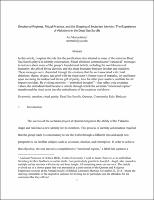Please use this identifier to cite or link to this item:
https://hdl.handle.net/20.500.12202/3951| Title: | Emotional Regimes, Ritual Practice, and the Shaping of Sectarian Identity: The Experience of Ablutions in the Dead Sea Scrolls |
| Authors: | Mermelstein, Ari 0000-0002-3572-9518 |
| Keywords: | emotional experience Rites & ceremonies Belief & doubt Aversion Grief Community rule Hodayot Purity Qumran Ritual |
| Issue Date: | 2016 |
| Publisher: | Brill Academic Publishers |
| Citation: | Emotional Regimes, Ritual Practice, and the Shaping of Sectarian Identity: The Experience of Ablutions in the Dead Sea Scrolls. Mermelstein, Ari. Biblical Interpretation 24.4/5 (2016): 492-513. |
| Abstract: | In this article, I explore the role that the purification rites attested in some of the sectarian Dead Sea Scrolls played in identity construction. Ritual ablutions communicated “canonical” messages to initiates about some of the group’s foundational beliefs, including the worthlessness of humanity, the gift of divine election, and the sharp boundary between insiders and outsiders. These messages were channeled through the emotions that the sect associated with ritual ablutions: shame, disgust, and grief with the ritual actor’s former state of impurity, joy and honor upon receiving the undeserved divine gift of purity, love for other pure insiders, and hate for all impure outsiders. By evoking emotions—“embodied thoughts”—that reflect core sectarian values, the embodied ritual became a vehicle through which the sectarian “emotional regime” transformed the ritual actor into the embodiment of the sectarian worldview. |
| URI: | https://dx.doi.org/10.1163/15685152-02445P04 https://hdl.handle.net/20.500.12202/3951 |
| ISSN: | 0927-2569 |
| Appears in Collections: | Yeshiva College: Faculty Publications |
Files in This Item:
| File | Description | Size | Format | |
|---|---|---|---|---|
| Mermelstein_emotional_regimes_ritual_practice_2016.pdf | Abstract with pre-print | 460.38 kB | Adobe PDF |  View/Open |
This item is licensed under a Creative Commons License

